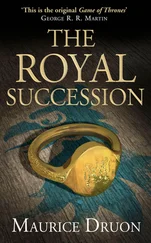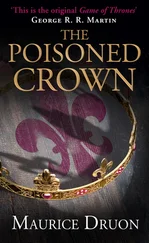On the English side, the phrase ‘any other for him or by him’ was an allusion to the King’s minority and to the existence of the Council of Regency; but the ‘by him’ might in the future equally well apply to the Seneschal of Guyenne or any other royal lieutenant. As for the expression ‘no new rights’, it could be taken to signify the ratification of the rights already acquired, including those granted by the treaty of 1327. But it was not said explicitly.
These declarations, like every treaty of peace or alliance between nations throughout history, depended for their application entirely on the good or bad will of the Governments concerned. For the moment, the fact that the two princes had come face to face was evidence of a mutual desire to live in amity.
Chancellor Burghersh unrolled a parchment to which was attached the seal of England and read out in the vassal’s name:
‘“Sire, I become your man of the Duchy of Guyenne and its appurtenances, which I claim to hold from you as Duke of Guyenne and Peer of France in accordance with the Treaties of Peace made between your predecessors and ours, and because of what we and our ancestors, Kings of England and Dukes of Guyenne, have done in the name of the said duchy for your predecessors, the Kings of France.”’
Then the Bishop handed Mille de Noyers the parchment he had just read. It had been much shortened in the drafting when the liegeman’s homage was cut out.
Mille de Noyers said in reply: ‘Sire, you become the man of my Lord the King of France for the Duchy of Guyenne and its appurtenances which you recognize that you as Duke of Guyenne and Peer of France hold from him, and in accordance with the Treaties of Peace made between his predecessors, Kings of France, and yours, and because of what you and your ancestors, Kings of England and Dukes of Guyenne, have done for his predecessors, Kings of France, in the name of the said duchy.’
All this would furnish splendid matter for dispute on the day the two countries fell out.
Then Edward III said: ‘In truth.’
And Mille de Noyers replied with these words: ‘The King, our Sire, receives you, subject to the protestations and reservations above stated.’
Edward stepped forward three paces to his suzerain. He took off his gloves and handed them to Lord Montacute. He reached out his slender white hands and put them in the large palms of the King of France. Then the two kings kissed.
It was remarked that Philippe VI did not need to bend down far to reach his young cousin’s face. The chief difference between them lay in Philippe’s robustness which made him seem so imposing. But there could be no doubt that the King of England, who was still growing, would develop into a fine figure of a man.
The bells in the higher tower began pealing again. Everyone was pleased. Peers and dignitaries nodded to each other in satisfaction. King John of Bohemia, behind his handsome auburn beard that spread down across his chest, looked noble and thoughtful. Count Guillaume the Good and his brother Jean of Hainaut exchanged smiles with the English lords. Truly it was a good deed that had just been done.
What was the use of quarrelling, growing angry, threatening, bearing plaints to Parliament, confiscating fiefs, besieging towns, fighting to the death with great waste of gold, toil and the blood of knights, when with a little goodwill on all sides such admirable agreement could be reached?
The King of England took his place on the throne prepared for him a little below that of the King of France. It remained now only to hear mass.
Yet Philippe VI seemed still to be waiting for something. He turned to the peers who were sitting in the stalls and looked for Robert of Artois, whose coronet stood out higher than all the rest.
Robert’s eyes were half shut. Though it was pleasantly cool in the cathedral, he was wiping the sweat from his brow with his red-gloved hand. His heart was beating very fast at this moment. He had not realized that the dye was running from his glove and there was a bloody streak across his face.
Suddenly he left his stall; he had made up his mind.
‘Sire,’ he cried, coming to a halt in front of Philippe’s throne, ‘since all your vassals are here assembled …’
A few moments before, Mille de Noyers and Bishop Burghersh had spoken in clear firm voices, audible throughout the great building. But when Robert spoke he made them sound like birds twittering.
‘… and since everyone has a right to your justice,’ he went on, ‘it is justice I come to ask of you.’
‘Monseigneur of Beaumont, my cousin, who has done you wrong?’ Philippe VI asked gravely.
‘I have been wronged, Sire, by your vassal Dame Mahaut of Burgundy who by guile and felony has sequested the title and possession of the County of Artois which is mine by right of inheritance from my ancestors.’
But a voice, very nearly as loud, was heard shouting from the stalls. ‘This was bound to happen sooner or later’
It was Mahaut of Artois.
The congregation showed some surprise perhaps, but no very great astonishment. Robert was following the precedent of the Count of Flanders at the coronation. It seemed to have become customary for a peer who thought himself wronged to bring his complaint forward on these solemn occasions; and it was obviously done with the King’s prior consent.
Duke Eudes of Burgundy looked inquiringly at his sister, the Queen of France, who gazed back at him and with a movement of her open hands gave him to understand that she was as much surprised as he was and knew nothing of the matter at all.
‘Cousin,’ said Philippe, ‘can you produce documents in evidence to prove your rights?’
‘I can,’ Robert said firmly.
‘He can’t, he’s lying!’ cried Mahaut, who now left the stalls and came to stand beside her nephew in front of the King.
How alike Robert and Mahaut were. They were wearing identical coronets and robes; they were both equally angry, and the blood was mounting in their bull-necks. Mahaut, too, was wearing the great, gold-hilted sword of a peer of France on her Amazonian flank. They could have looked no more alike had they been mother and son.
‘Aunt,’ said Robert, ‘do you deny that the marriage contract made by my noble father, Count Philippe of Artois, appointed me, his first-born, heir to Artois, and that you took advantage of my being a child to dispossess me after my father’s death?’
‘I deny every word of it, you wicked nephew! How dare you try to disgrace me?’
‘Do you deny there was a marriage contract?’
‘I deny it!’ shouted Mahaut.
There was an angry murmur throughout the cathedral, and old Count de Bouville, who had been Chamberlain to Philip the Fair, was distinctly heard to utter a scandalized ‘Oh!’ Though it was not everyone who had as good reason as Bouville, who had been Curator of Queen Clémence’s stomach at the time of the birth of Jean I, the Posthumous, to know Mahaut of Artois’ remarkable capabilities in the realms of perjury and crime, it was quite obvious that she was flagrantly denying the evidence. A marriage between a son of the House of Artois, a prince of the fleur de lis, 10and a daughter of the House of Brittany would most certainly not have been arranged without a contract ratified both by the King and the peers of the time. Duke Jean of Brittany, though he had been a child at the time of the marriage, remembered it perfectly and was telling his neighbours so. This time Mahaut had gone too far. It was one thing to plead, as she had done in two lawsuits, the ancient custom of Artois, which was in her favour owing to the premature death of her brother, but it was quite another to deny that there had been a marriage contract. She merely succeeded in confirming everyone’s suspicions; and, in particular, that she had done away with the documents herself.
Читать дальше












